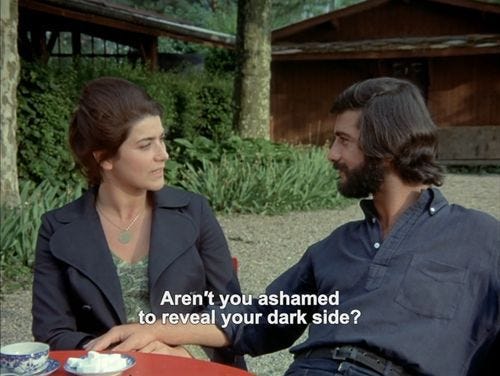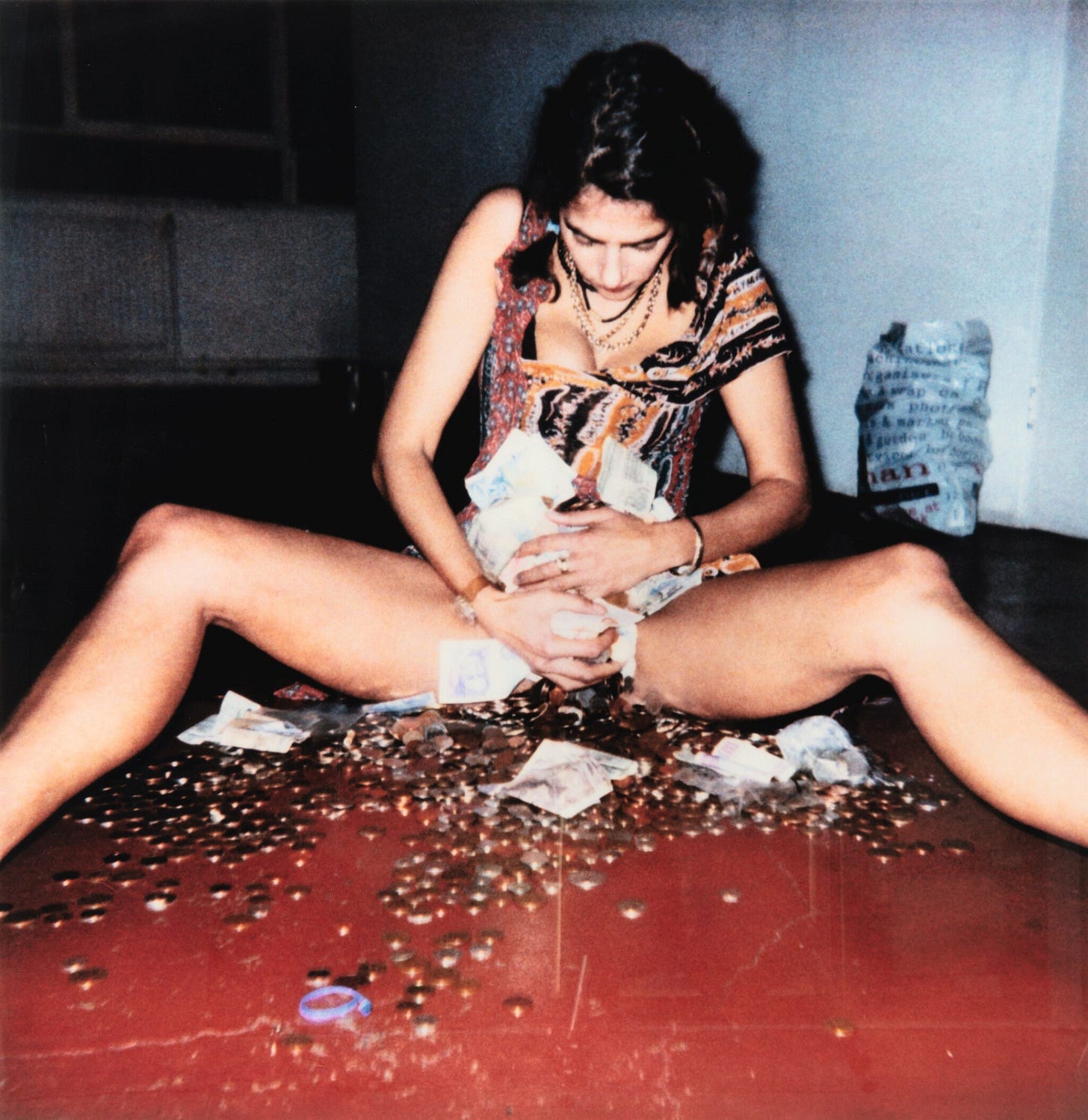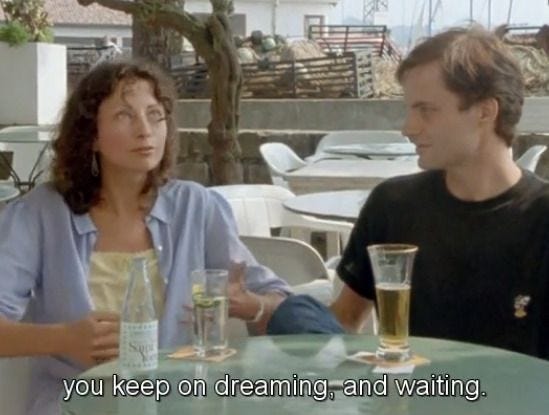the secret
an honest and confidential return
Hello! If you’re wondering what this unfamiliar missive is doing in your already crowded inbox, let me reintroduce myself as Shirin, the human creature who used to write this newsletter about the things that bring us joy. I still write, and pause, although I have not pressed send in a long while. Before we get to the big secret as per the headline, I want to thank you for sticking around (I’m so happy you’re here!) and reassure you it’s ok for you to ‘leave the group chat’ if your interests no longer align with the newsletter’s <3
Even I can admit sending out a letter about a most controversial self-help book could be a bit of a risqué move, but I have reasons. As you may have guessed, my unspeakable secret is that I have at last read the Oprah-sanctioned, 35-million-copy bestseller all your spiritually inclined friends have rightly disparaged on Goodreads: Rhonda Byrne’s The Secret. With a literary reputation to uphold and a penchant for cultural snobbery, this is perhaps the most damning public confession I could be making at this time.
While I accomplished the remarkable feat of reading The Secret only in the last week of August, I have been one of the book’s fiercest critics for at least a few years, since a dear friend —a brilliant, talented woman— admitted that the slim volume with the uninteresting cover had singlehandedly contributed to the significant shift she had set in motion in her own life. My friend’s genuine assertion left me outright startled. At the time, I failed to press her further on the matter due to both my lack of insight into the topic and my poor health, which would land me in the emergency room a mere 24 hours after our conversation.
Eventually, I did muster enough courage to open the book —metaphorically speaking, as I relied on a digital copy; imagine cutting down trees to print The Secret!— only to wrestle with the text and surrender a page or two into the first chapter. My impression was that I couldn’t possibly bring distress of such magnitude upon my diligent brain. So, after burning sage to cleanse my Kindle of Rhonda Byrne’s illiterate energy, I had no choice but to bail out of my self-sanctioned mission and bid farewell to the manifesting business for the foreseeable future.
In the three years which have followed, I have taken upon myself to offer a vigorous critique of The Secret to every soul who dared mention its name in my presence. My merciless disquisition on the many literary and factual sins committed by the self-help sensation was delivered along with an honest admission of a DNF (“did not finish” in bookish jargon) to which my interlocutor would interject with an exhortation to fully read the book before condemning it so harshly. Fast forward to several weeks ago when I decided the time had come for me to have my mind blown and life changed by Rhonda’s vision after yet another friend had broached the subject.
At the risk of disappointing your expectations, I won’t review the book in detail1. It suffices to say that The Secret exposes readers to their innate capacity to manifest anything they desire by simply believing in it as if it were already true. Money, health, and love are some of the areas in which Byrne encourages her followers to manifest their dreams through the force of their own thoughts.
“You are like a human transmission tower, transmitting a frequency with your thoughts. If you want to change anything in your life, change the frequency by changing your thoughts.”
What sets The Secret apart from analogous self-help bestsellers is a baffling structural incoherence, which lends itself to generate a shapeless blob of repetitive statements whose evidence is nowhere to be found.
“You are the most powerful magnet in the universe! You contain a magnetic power within you that is more powerful than anything in this world, and this unfathomable magnetic power is emitted through your thoughts.”
The way the same concept is reiterated over and over again without providing any in-depth considerations or auxiliary practices to implement these claims is irritating at best. This is the kind of book that gives legitimate self-help a bad reputation, which alongside its embarrassing superficiality, is what I found most irksome.
My intention for this letter is not to launch a personal crusade against the genre or one in favour of a strictly positivist approach to life. We know so little about our brain’s actual capabilities that to deny the role our thinking plays into our lives without reservation would be silly, if not limiting in its anti-scientific refusal to acknowledge the truly infinite potentiality each of us holds. I am also partial to a decent self-help book, which can often help us get unstuck by providing a much-needed pep talk. So, despite my rather searing critique of Byrne’s cash cow editorial enterprise, I still believe in reading widely and exploring the breadth of knowledge the world offers to support the development of our intellectual, emotional and spiritual journeys.
“The catch is, to transmit the higher frequency of love, you must love yourself.”
In spite of the flagrant missteps mentioned above, The Secret’s quasi-religious, bordering on dogmatic litany inspired insightful observations which proved far more precious than any manifested gift could ever be. (Unless I succeed in manifesting a sizeable lottery win. In that case, do count me among The Secret converts.)
The pedantic emphasis placed on the facture of the thoughts we produce daily prompted me to examine the quality of the signals emitted by my own transmission tower, the thinking mind. For years I have prided myself in having operated a substantial shift in attitude with regards to less-than-ideal life conditions like illness, various threads of trauma or isolation. Curiously enough, once I was left to grapple with the mantra-like nature of The Secret, it became clear that a good portion of what traverses my head and heart is often wrapped in an almost imperceptible veil of apprehension.
The reflections which emerged from reading The Secret crystallised the only secret I truly yearned to learn, since they helped me shed light on the festering truth I had kept hidden in fear of having to face the unpleasant remnants of ingrained patterns I am yet to unpack. The unforeseen epiphany was the realisation that I often still move from a place of fear rather than tender and joyous surrender.
In the immediate aftermath of my encounter with The Secret, I returned to the wisdom of Buddhist nun and teacher Pema Chödrön, whose words administered a mandatory palate cleanse as the sour aftertaste of The Secret lingered for days. Several of Byrne’s manifesting tenets run counter to the Buddhist teachings which have shaped my path in the last years. For instance, among the notions one learns when first approaching Buddhism is the idea that framing thinking as inherently positive or negative is a dangerously misguided habit our monkey mind inadvertently engages with.
The Secret’s perpetual iteration of positive thinking appears to be rather an invitation to sweep inconvenient feelings under the rug, much to the detriment of the ‘nutrients’ one could obtain from sitting with and ‘digesting’ those feelings we perceive and label as negative. In this respect, it seems that by following the somewhat opaque instructions Byrne lays out, we’d only end up deluding ourselves by channeling expectations into some future which is by definition unknown and unknowable. To those of us prone to rumination and control, The Secret could give permission to sink deep into a state of self-deception that can only sow disappointment.
The way Byrne represents manifesting as a purely intellectual exercise also undermines the idea that this practice could be something more than a handful of positive affirmations. Although she argues that one has to “feel” the vision rather than simply “see” it, to tap into the source of our dormant energy would require a radical shift in the way we operate daily on an emotional level. Indeed, while the book professes to be the doorway to unbounded possibilities, it ends up hindering their attainment by ignoring the work required to reach a place where one feels centered enough to actually embody gratitude and abundance.
Chödrön’s words gracefully snapped me out of the sinister spell The Secret had cast on me. If, one the one hand, I had become aware of the subterranean routes fear had taken to travel through my body and spirit; on the other, I had gradually cultivated a soft obsession with manifesting solutions to the issues currently affecting my wellbeing. Even more so, I had hoped to expeditiously banish my fear. In the midst of this visualising frenzy, I let my daily, dutiful practice slip, while I developed an attachment to imagined outcomes whose predicted dissolution hovered like a moth around a flame.
“Fear has to do with wanting to protect your heart,” writes Chödrön, in what may be the most self-evident yet illuminating line I have come across lately. It reminds me of the things my heart needs protecting from, but also of the patient work that is necessary to embrace the fear, hold her close to my heart and attentively listen to the treasured stories she whispers into my ear.
You can listen to this entertaining chat in which the folks at the “If Books Could Kill” podcast dissect The Secret.






